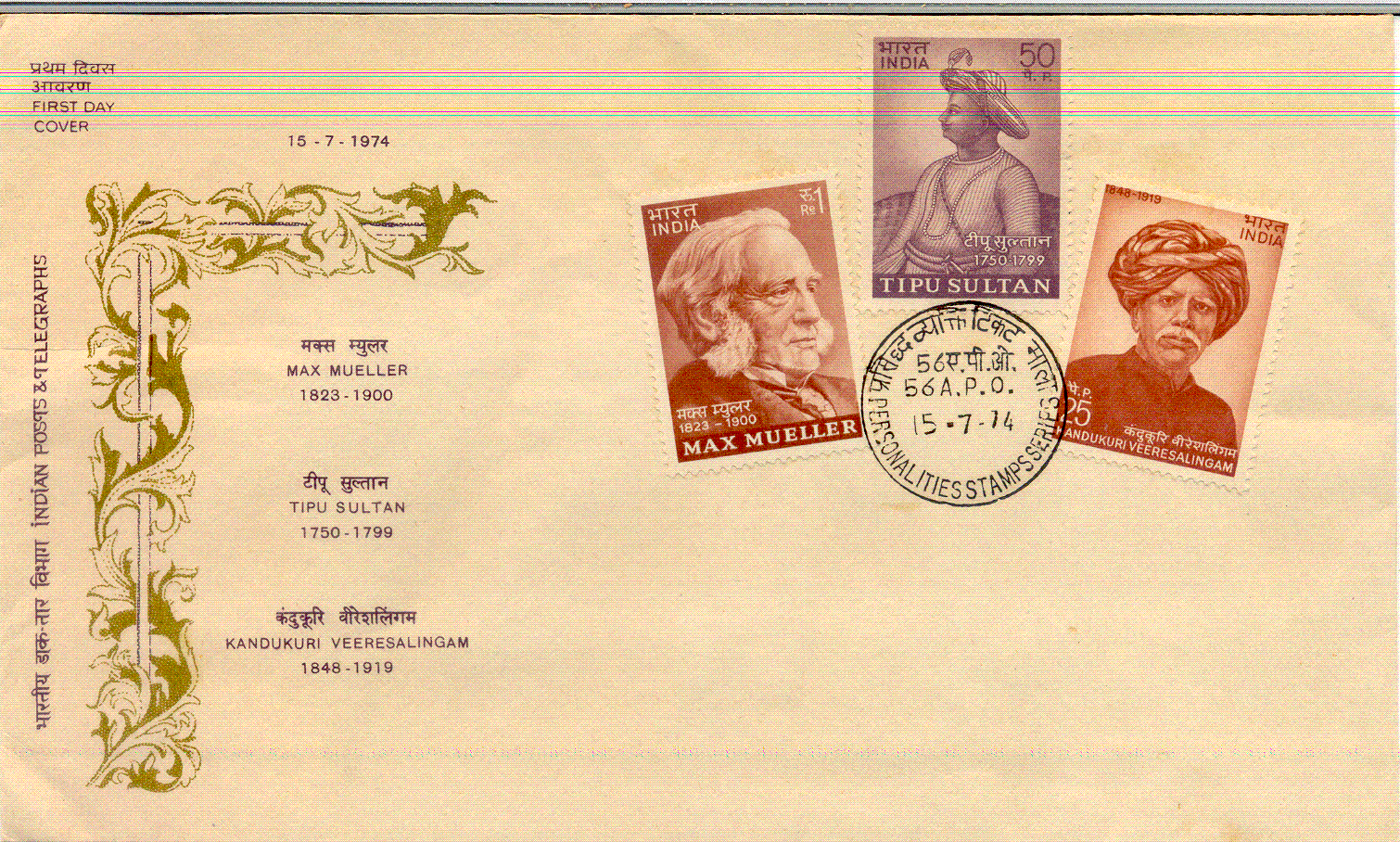(Re1.00) Friedrich Max Müller (6 December 1823 – 28 October 1900), generally known as Max Müller, was a German-born philologist and Orientalist, who lived and studied in Britain for most of his life. He was one of the founders of the western academic field of Indian studies and the discipline of comparative religion. Müller wrote both scholarly and popular works on the subject of Indology and the Sacred Books of the East, a 50-volume set of English translations, was prepared under his direction. He also put forward and promoted the idea of a Turanian family of languages and Turanian people.
(50P) Tipu Sultan (20 November 1750 – 4 May 1799), also known as the Tiger of Mysore and Tipu Sahib, was a ruler of the Kingdom of Mysore and a scholar, soldier, and poet. He was the eldest son of Sultan Hyder Ali of Mysore. Tipu introduced a number of administrative innovations during his rule, including his coinage, a new Mauludi lunisolar calendar, and a new land revenue system which initiated the growth of Mysore silk industry. Tipu expanded the iron-cased Mysorean rockets and wrote the military manual Fathul Mujahidin, considered a pioneer in the use of rocket artillery. He deployed the rockets against advances of British forces and their allies in their 1792 and 1799 Siege of Srirangapatna.
Napoleon, the French commander-in-chief who later became emperor, sought an alliance with Tipu. In alliance with the French in their struggle with the British, and in Mysore's struggles with other surrounding powers, both Tipu and his father used their French trained army against the Marathas, Sira, and rulers of Malabar, Kodagu, Bednore, Carnatic, and Travancore. During Tipu's childhood, his father rose to take power in Mysore, and upon his father's death in 1782, Tipu succeeded to a large kingdom bordered by the Krishna River in the north, the Eastern Ghats in the east, and the Arabian Sea in the west. He won important victories against the British in the Second Anglo-Mysore War, and negotiated the 1784 Treaty of Mangalore with them after his father Hyder Ali suddenly died from cancer in December 1782 during the Second Anglo-Mysore War.
Tipu engaged in expansionist attacks against his neighbours. He remained an implacable enemy of the British East India Company, bringing them into renewed conflict with his attack on British-allied Travancore in 1789. In the Third Anglo-Mysore War, Tipu was forced into a humiliating treaty, losing a number of previously conquered territories, including Malabar and Mangalore. He sent embassies to foreign states, including the Ottoman Turkey, Afghanistan, and France, in an attempt to rally opposition to the British. In the Fourth Anglo-Mysore War, the combined forces of the British East India Company and the Nizam of Hyderabad defeated Tipu, and he was killed on 4 May 1799 while defending his fort of Srirangapatna. The Karnataka Government has been lately trying to portray Tipu Sultan as a State Hero. He is regarded a hero in Pakistan as well, and the PNS Tippu Sultan ships of the Pakistan Navy are named after him. But outside the old region of Mysore, in some South Indian regions such as Kodagu, Malabar, and Dakshina Kannada, Tipu has been accused of religious bigotry.
(25P) Rao Bahadur Kandukuri Veeresalingam also spelled as Kandukuri Veereshalingam (16 April 1848 – 27 May 1919), also known as Kandukuri Veereshalingam Pantulu, was a social reformer of Andhra Pradesh. He is widely considered as the man who first brought about a renaissance in people and Telugu literature. . He was influenced by the ideals of Brahmo Samaj particularly those of Keshub Chunder Sen. He got involved in the cause of social reforms. In 1876 he started a Telugu journal and wrote the first prose for women. He encouraged education for women, and started a school in Dowlaiswaram in 1874. He started a social organisation called Hitakarini Samajam (Benefactor).
He had many firsts to his credit: novelist (Rajasekhara Charitra inspired by Oliver Goldsmith’s The Vicar of the Wakefiled), critic, autobiographer, biographer, essayist, poet, writer of plays and playlets, satirist, investigative journalist (One judge dispensing judgments and dismissing justice committed suicide after the expose), scientific writing. He translated many books from Sanskrit and English into Telugu. He also contributed to children’s literature by basing his children’s book on Aesop’s Fables. He was all for vernacular Telugu, which became the precursor of the language now.

No comments:
Post a Comment